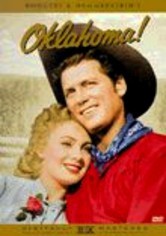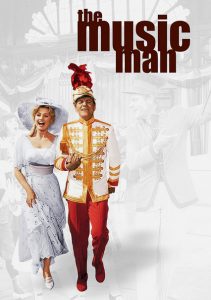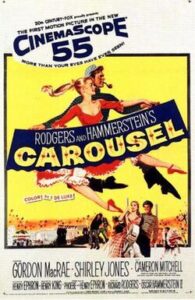Oklahoma! -1955
Director Fred Zinneman
Starring Gordon MacRae, Shirley Jones, Rod Steiger
Top 250 Films #184
Scott’s Review #51
Reviewed June 20, 2014
Grade: A-
Oklahoma! (1955) is one of a slew of memorable Rodgers and Hammerstein musicals to emerge from the 1950s and 1960s Hollywood and to be based on a popular stage version.
The film has an old-west, homespun, comfortable appeal. It is best enjoyed during the summer months.
While Oklahoma! seems a bit too hokey and is not my favorite musical compared to other more sophisticated stalwarts such as My Fair Lady (1964), An American in Paris (1951), or The Sound of Music (1965), it emits a flavor and tasteful appeal of the West.
The plot focuses on a love triangle between a good old boy, Curly, a good girl, Laurey Williams, and brooding Jud, though the real rooting couple is Curly and Laurey.
The trio is supported by many townspeople who gossip about them and help Curly and Laurey admit their true feelings and unite as a couple.
Of course, Jud is the villain, and conflicts come into play throughout the production.
A lesser couple, Will Parker and Ado Annie, also enter each other’s arms amid traditional small-town events such as a lively summer fair.
Stars Gordon MacRae (Curly) and Shirley Jones (Laurey) are very handsome and likable in the lead roles, making for a nice pairing.
Gloria Grahame is as appealing and comical as Ado Annie, especially in her rousing turn bellowing out, “I Can’t Say No,” Charlotte Greenwood is the moral voice of reason as Aunt Eller.
What works best in the film are the settings of Oklahoma, as the viewer experiences such a feel for life in the heartland long ago (though the exteriors were shot in Arizona).
It’s pure fantasy enjoyment with a magical Wizard of Oz feel, though no cyclone or munchkins are anywhere in sight. The film version closely follows the original stage version.
The musical numbers are pretty catchy (“Oh What a Beautiful Morning,” “I Can’t Say No,” and “Oklahoma” are my favorites). The controversial mid-number “Dream Ballet” is provocative, artistically enjoyable, and jarringly different from the rest of the traditional tale.
This jaw-dropping number mirrors a similar spectacle in An American in Paris.
Perhaps Oklahoma! is not entirely on par with other musicals of its day but darned close.
Oscar Nominations: 2 wins-Best Scoring of a Musical Picture (won), Best Sound Recording (won), Best Cinematography, Color, Best Film Editing


